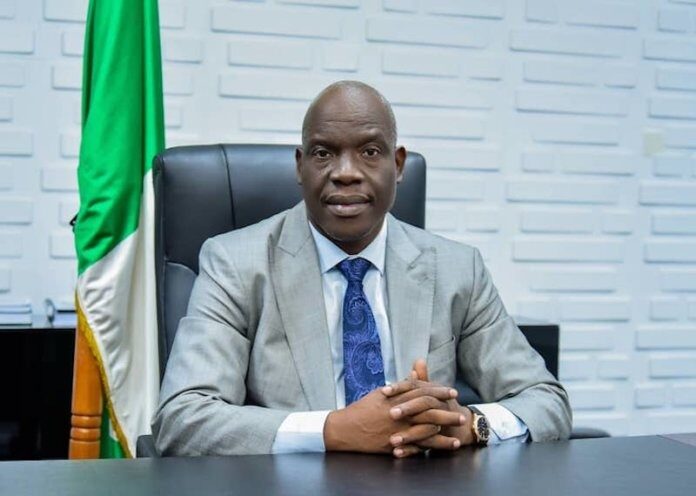The Nigerian Upstream Petroleum Regulatory Commission (NUPRC) has reaffirmed its commitment to driving investment, boosting production, and promoting indigenous capacity development as core pillars of Nigeria’s oil and gas future.
Commission Chief Executive, Engr. Gbenga Komolafe made the commitment while delivering his goodwill message at the 2025 Nigerian Oil and Gas Opportunity Fair (NOGOF) in Yenagoa, Bayelsa
State
The theme of NOGOF 2025 is “Driving Investment and Production Growth: Shaping a Sustainable Future for Nigeria’s Oil and Gas Industry Through Indigenous Capacity Development.”
Komolafe who was represented by the Executive Commissioner for Health, Safety, Environment and Community (HSEC), Capt. John R. Tonlagha, emphasized the importance of building local content and fostering sustainability in the upstream oil and gas sector.
He commended the Nigerian Content Development and Monitoring Board (NCDMB) and its partner, Jake Riley Limited, for providing a platform that brings together local and international stakeholders to showcase innovations and build critical industry linkages.
Highlighting the role of a stable regulatory environment in attracting investments, he stressed the need for transparency, fiscal certainty, and confidence in Nigeria’s legal framework to encourage both local and foreign capital inflows.
“To achieve sustainable growth in the oil and gas sector, robust upstream investments are essential. Attracting both local and foreign investment requires concerted efforts to create an enabling environment characterized by stability, transparency, and regulatory certainty. Investors must have confidence in our legal and fiscal frameworks, confident that their investments are secured and will deliver profitable returns,” Tonlagha said.
He further noted that achieving sustainable growth would require embracing advanced technologies, optimizing existing resources, and investing in infrastructure that supports exploration and production.
“Production growth, on the other hand, hinges on optimizing our existing resources and exploring new frontiers. This involves adopting cutting-edge technologies and best practices to enhance efficiency and reduce operational costs.
“It also means investing in infrastructure development to support exploration, development and production activities. By doing so, we can maximize our production capacity and ensure a steady crude oil and gas supply to meet both domestic and international demand,” Tonlagha noted.
The NUPRC, he said, has developed initiatives in line with the Petroleum Industry Act (PIA) 2021 to promote a balance between energy development and environmental protection. One such initiative is the recently unveiled Upstream Decarbonization and Sustainability Blueprint, co-created with industry stakeholders to guide Nigeria’s transition to low-carbon operations.
“We recognize the connectivity between climate change and energy security, particularly within the context of upstream petroleum operations. We are committed to fostering a sustainable and resilient industry that minimizes its environmental impact on our host communities, while optimising our hydrocarbon development for our collective benefit,” he stated.
“The Commission has unveiled and issued the Upstream Decarbonization and Sustainability Blueprint at the just concluded Upstream Decarbonization and Energy Sustainability Forum. The Blueprint was co-created with the industry to serve as a roadmap for low-carbon operations and attainment of net-zero aspiration of the Country.”
CCE also pointed to the implementation of the Host Community Development Trust (HCDT) as a transformative step in community engagement. Mandated by Chapter 3 of the PIA 2021, the HCDT provides a framework for investing in healthcare, education, and infrastructure in host communities.
In conclusion, the Commission called for a multifaceted strategy involving favorable investment conditions, skill development, and environmental responsibility to secure a prosperous future for Nigeria’s oil and gas industry.
“In conclusion, driving investment and production growth in Nigeria’s oil and gas industry requires a multifaceted approach. It demands creating a favourable investment climate, developing indigenous capacity, and ensuring sustainability through environmental stewardship.
“By working together, we can shape a future where the oil and gas sector continues to be a pillar of our economy, contributing to national development and improving the quality of life for all Nigerians,” he added.
The fair is one of the flagship events of the NCDMB and draws key stakeholders from across the energy value chain to explore opportunities and deepen investment in Nigeria’s evolving oil and gas industry.
























